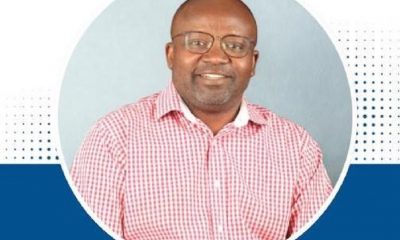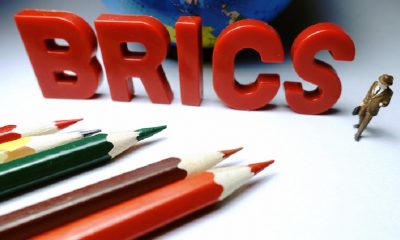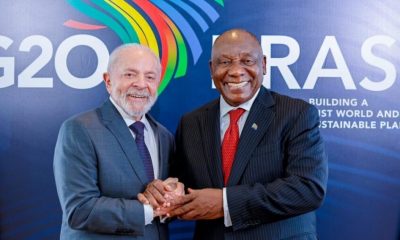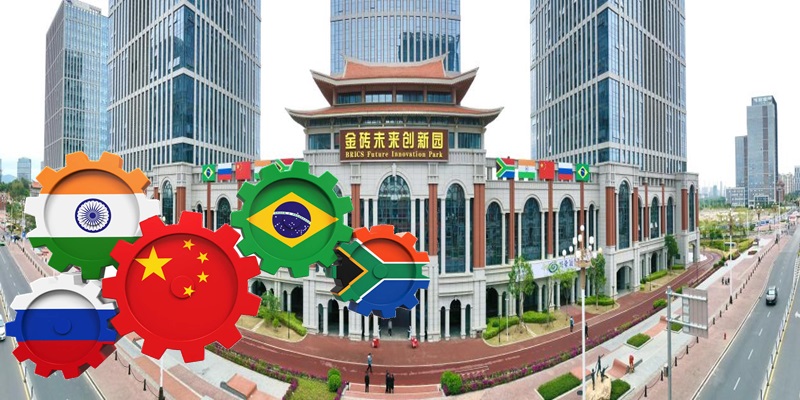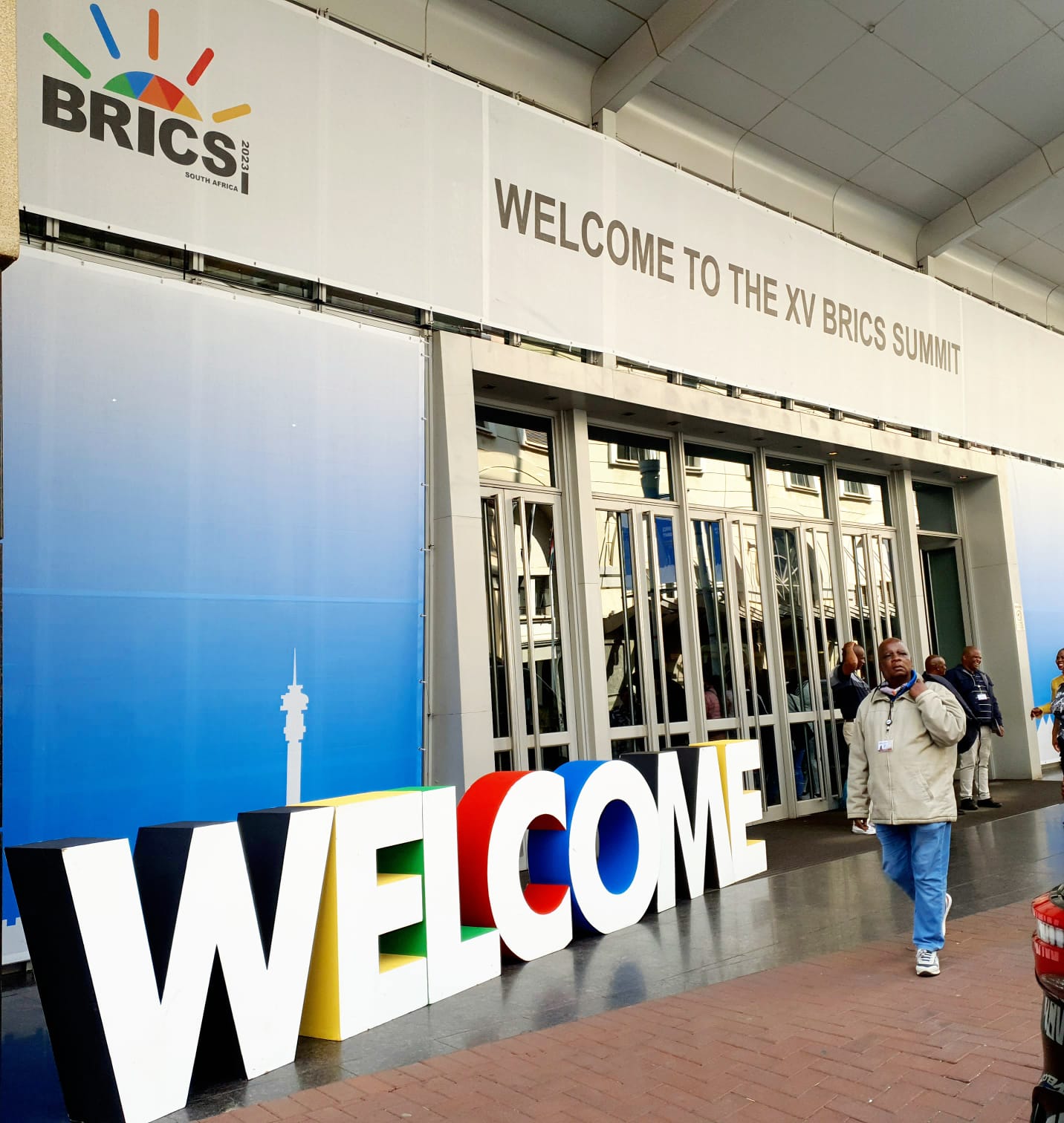World
Understanding BRICS, WHO and COVID-19

By Kester Kenn Klomegah
The World Health Organization (WHO), establish to tackle global health problems, is mobilizing for additional funds to overcome coronavirus which it declared pandemic late January 2020.
The coronavirus pandemic has, undoubtedly, changed the ways of life, impacted on the capacities of health infrastructure and has disrupted the economic supply value chain with attendant negative impact on global economies. As the world grapples with the challenges of the coronavirus, there is a need for solidarity, unity of purpose and better coordination to overcome this common enemy.
In order to find long-term and sustainable solutions to the pandemic, WHO has been collaborating with the United Nations, the International Monetary Fund and the World Bank, and regional organizations such as African Union, G20 and BRICS. Besides, there is a strong cooperation in the format Russia-India-China (RIC). It is also making ways through bilateral and multilateral mechanisms.
Foreign countries are contributors to the functioning of World Health Organization. For example, U.S. is the single largest funder of the organization, providing more than $400 million each year – about 15% of its total budget. WHO has come under criticisms. Many countries especially the United States and Britain, believe that WHO’s reluctance to confront China over its handling of the coronavirus outbreak is the reason it has now become a pandemic.
As the world leaders pledged to accelerate work on tests, drugs and vaccines against COVID-19 and to share them around the globe, the United States stayed away from an initiative launched on April 24 by the World Health Organization.
According to Reuters report, French President Emmanuel Macron, German Chancellor Angela Merkel and South African President Cyril Ramaphosa were among those who joined a video conference to launch what the WHO billed as a “landmark collaboration” to fight the pandemic. Leaders from Asia, the Middle East and the Americas also joined the videoconference, but several big countries did not participate, including China, India and Russia.
The aim is to speed development of safe and effective drugs, tests and vaccines to prevent, diagnose and treat COVID-19, the lung disease caused be the novel coronavirus – and ensure equal access to treatments for both rich and poor. “We are facing a common threat which we can only defeat with a common approach,” WHO Director General, Tedros Adhanom Ghebreyesus, said as he opened the virtual meeting.
South African leader Cyril Ramaphosa is the chair of the African Union. Currently, Russia holds the rotating chair of BRICS. BRICS is also coordinating efforts of its members to help in finding solution to COVID-19. Russia, India and China are in very strong positions in the group or association. China and India have huge population. Despite its vast territory, Russia’s population is slightly higher than Japan in the Pacific Ocean.
China, a leading global player and business footprint, said it would donate a further $30 million to the World Health Organization, which is seeking more than $1 billion to fund its battle against the coronavirus pandemic that has killed more than 180,000 people worldwide. “At this crucial moment, supporting WHO is supporting multilateralism and global solidarity,” Hua Chunying, spokeswoman of China’s Foreign Ministry, said on Twitter.
The donation aimed to support the global fight against COVID-19, in particular strengthening health systems in developing countries, she said, adding that China had already donated $20 million to the WHO on March 11.
According to an executive decree posted to Kremlin’s website, Russia will contribute $1 million to the World Health Organization (WHO) to fight the coronavirus. “Allocate budget funding of $1 million from the federal budget for one-time voluntary contribution to the World Health Organization for coronavirus infection fight measures implementation,” the document reads.
The same decree earmarks about $804,795 to fund expenses of the Vector Institute and the Central Research Institute of Epidemiology, “connected to production and shipment of tools for laboratory diagnosis of the novel coronavirus infection, and material and technical support to countries of Eastern Europe, Trans-Caucasus, Central and Southeast Asia, the Middle East, Africa and South America.”
As stipulated by the guidelines, Russia assumed the rotating presidency of the BRICS (Brazil, Russia, India, China and South Africa) regional association since January, 2020. BRICS has established as a multilateral structure, and as reliable association pushing for fair, democratic and multipolar world order.
Russia continues to expand strategic partnership of the organization, working on strengthening foreign policy coordination on various multilateral platforms. Russian Foreign Minister Sergey Lavrov heads the foreign ministers of the BRICS association of countries. On April 28, this group plans to hold an extraordinary videoconference to exchange opinions on possible joint measures to oppose the coronavirus pandemic.
“At Russia’s initiative, the foreign policy chiefs of the BRICS countries will hold an extraordinary conference in a video format under Russian Foreign Minister Sergey Lavrov’s chairmanship on April 28,” the Foreign Ministry said in a statement.
The foreign ministers will “focus on aspects of the influence of the crisis prompted by the outbreak of the coronavirus infection on international relations. The ministers will exchange opinions on possible joint measures the five countries could take to oppose Covid-19 and address the financial, trade-economic, and social consequences of the pandemic,” the statement said.
“The parties will also consider relevant aspects of the development of a five-sided strategic partnership, including a calendar of events during Russia’s presidency of the BRICS this year,” it said.
Russian Deputy Foreign Minister Sergey Ryabkov said during an online launch of the Moscow-based Higher School of Economics’ report on Russia’s foreign policy, “Our organization keeps an eye on the fight against COVID-19. Russia considers various aspects of the issue during its chairmanship of BRICS. Health experts maintain contacts. We will also consider various political aspects of the situation within BRICS.”
The Russian diplomat added that BRICS was an appropriate platform for such cooperation, “given the scientific capabilities of its members, particularly in the fields of healthcare and pharmaceutical industry.” “Each of the countries is making its own contribution to these efforts. We will bring it all together during our chairmanship so that at the end of the year we can say that BRICS has made another step forward,” Ryabkov emphasized.
On April 23, TASS report said that BRICS member states could increase their funding of the World Health Organization and expand medical cooperation with other states due to the US decision to withdraw its contributions to the organization.
“A few days ago, the US announced that it would withdraw or suspend funding of the World Health Organization. BRICS states could make a statement, in which they would announce their increased contributions to this organization that plays a central role in the global anti-pandemic governance,” according to Dmitry Suslov, deputy head of the Center for Comprehensive European and International Studies of the Higher School of Economics National Research University. “BRICS states could announce further coordination in their approaches to aiding other states, states with weaker healthcare systems than those of BRICS states.”
The expert stressed that the spread of the disease in less developed countries would threaten the security of BRICS member states. Suslov, however, noted that BRICS is interested in strengthening the healthcare system in such states.
Cui Zheng, deputy head of the Research Center for the Economies and Politics of Transitional Countries at Liaoning University, expressed a similar opinion. He noted that China actively helps their partners within BRICS to combat the novel coronavirus pandemic.
“The most important thing for us is international cooperation within BRICS. The member states have clearly stated their solidarity, uniting in the fight against the coronavirus,” the expert stated. “Not only do China and Russia actively help each other, they are supplying materials needed to combat the coronavirus to other states.”
While coronavirus is currently the urgent task, reiterating here that, besides all, the BRICS is interested in increasing financial and economic cooperation among the participating countries, effective industrial interaction and practical cooperation in developing and implementing new joint energy, telecommunications and high-tech projects.
The coronavirus disease appeared first in 2019 in Wuhan city in China. The disease was, first identified in Wuhan and Hubei, both in China early December 2019. The original cause still unknown, it remains a puzzle and an enigma for the world scientific community. Since then, cases of the novel coronavirus – named COVID-19 by the WHO – have spread around the world.
According to the latest statistics, over 2,700,000 people have been infected worldwide and more than 191,000 deaths have been reported. In addition, so far, over 750,000 individuals have recovered from the illness across the globe.
The BRICS member countries (Brazil, Russia, India, China and South Africa) collectively represent about 26% of the world’s geographical area and are home to 3.6 billion people, about 42% of the world’s population and a combined nominal GDP of $16.6 trillion.
Kester Kenn Klomegah writes frequently about Russia, Africa and the BRICS.
World
African Visual Art is Distinguished by Colour Expression, Dynamic Form—Kalalb

By Kestér Kenn Klomegâh
In this insightful interview, Natali Kalalb, founder of NAtali KAlalb Art Gallery, discusses her practical experiences of handling Africa’s contemporary arts, her professional journey into the creative industry and entrepreneurship, and also strategies of building cultural partnership as a foundation for Russian-African bilateral relations. Here are the interview excerpts:
Given your experience working with Africa, particularly in promoting contemporary art, how would you assess its impact on Russian-African relations?
Interestingly, my professional journey in Africa began with the work “Afroprima.” It depicted a dark-skinned ballerina, combining African dance and the Russian academic ballet tradition. This painting became a symbol of cultural synthesis—not opposition, but dialogue.
Contemporary African art is rapidly strengthening its place in the world. By 2017, the market was growing so rapidly that Sotheby launched its first separate African auction, bringing together 100 lots from 60 artists from 14 foreign countries, including Algeria, Ghana, Mali, Nigeria, Senegal, and others. That same year during the Autumn season, Louis Vuitton Foundation in Paris hosted a major exhibition dedicated to African art. According to Artnet, sales of contemporary African artists reached $40 million by 2021, a 434% increase in just two years. Today, Sotheby holds African auctions twice a year, and in October 2023, they raised $2.8 million.
In Russia, this process manifests itself through cultural dialogue: exhibitions, studios, and educational initiatives create a space of trust and mutual respect, shaping the understanding of contemporary African art at the local level.
Do you think geopolitical changes are affecting your professional work? What prompted you to create an African art studio?
The international context certainly influences cultural processes. However, my decision to work with African themes was not situational. I was drawn to the expressiveness of African visual language—colour, rhythm, and plastic energy. This theme is practically not represented systematically and professionally in the Russian art scene.
The creation of the studio was a step toward establishing a sustainable platform for cultural exchange and artistic dialogue, where the works of African artists are perceived as a full-fledged part of the global cultural process, rather than an exotic one.
To what extent does African art influence Russian perceptions?
Contemporary African art is gradually changing the perception of the continent. While previously viewed superficially or stereotypically, today viewers are confronted with the depth of artistic expression and the intellectual and aesthetic level of contemporary artists.
Portraits are particularly impactful: they allow us to see not just an abstract image of a “continent,” but a concrete personality, character, and inner dignity. Global market growth data and regular auctions create additional trust in African contemporary art and contribute to its perception as a mature and valuable movement.
Does African art reflect lifestyle and fashion? How does it differ from Russian art?
African art, in my opinion, is at its peak in everyday culture—textiles, ornamentation, bodily movement, rhythm. It interacts organically with fashion, music, interior design, and the urban environment. The Russian artistic tradition is historically more academic and philosophical. African visual art is distinguished by greater colour expression and dynamic form. Nevertheless, both cultures are united by a profound symbolic and spiritual component.
What feedback do you receive on social media?
Audience reactions are generally constructive and engaging. Viewers ask questions about cultural codes, symbolism, and the choice of subjects. The digital environment allows for a diversity of opinions, but a conscious interest and a willingness to engage in cultural dialogue are emerging.
What are the key challenges and achievements of recent years?
Key challenges:
- Limited expert base on African contemporary art in Russia;
- Need for systematic educational outreach;
- Overcoming the perception of African art as exclusively decorative or ethnic.
Key achievements:
- Building a sustainable audience;
- Implementing exhibition and studio projects;
- Strengthening professional cultural interaction and trust in African
contemporary art as a serious artistic movement.
What are your future prospects in the context of cultural diplomacy?
Looking forward, I see the development of joint exhibitions, educational programs, and creative residencies. Cultural diplomacy is a long-term process based on respect and professionalism. If an artistic image is capable of uniting different cultural traditions in a single visual space, it becomes a tool for mutual understanding.
World
Ukraine Reveals Identities of Nigerians Killed Fighting for Russia

By Adedapo Adesanya
The Ukrainian Defence Intelligence (UDI) has identified two Nigerian men, Mr Hamzat Kazeem Kolawole and Mr Mbah Stephen Udoka, allegedly killed while fighting as Russian mercenaries in the war between the two countries ongoing since February 2022.
The development comes after Russia denied knowledge of Nigerians being recruited to fight on the frontlines.
Earlier this week, the Russian Ambassador to Nigeria, Mr Andrey Podyolyshev, said in Abuja that he was not aware of any government-backed programme to recruit Nigerians to fight in the war in Ukraine.
He said if at all such activity existed, it is not connected with the Russian state.
However, in a statement on Thursday, the Ukrainian Defence released photographs of Nigerians killed while defending Russia.
“In the Luhansk region, military intelligence operatives discovered the bodies of two citizens of the Federal Republic of Nigeria — Hamzat Kazeen Kolawole (03.04.1983) and Mbah Stephen Udoka (07.01.1988),” the statement read.
According to the statement, both men served in the 423rd Guards Motor Rifle Regiment (military unit 91701) of the 4th Guards Kantemirovskaya Tank Division of the armed forces of the Russian Federation.
UDI said that they signed contracts with the Russian Army in the second half of 2025 – the deceased Mr Kolawole on August 29 and Mr Udoka on September 28.
“Udoka received no training whatsoever — just five days later, on October 3, he was assigned to the unit and sent to the temporarily occupied territories of Ukraine,” the report read.
It added that no training records for Mr Kolawole have been preserved; however, it is highly likely that he also received no military training, but his wife and three children remain in Nigeria.
Both Nigerians, the report added, were killed in late November during an attempt to storm Ukrainian positions in the Luhansk region.
“They never engaged in a firefight — the mercenaries were eliminated by a drone strike,” UDI stated, warning foreign citizens against travelling to the Russian Federation or taking up any work on the territory of the “aggressor state”.
“A trip to Russia is a real risk of being forced into a suicide assault unit and, ultimately, rotting in Ukrainian soil,” the statement read.
In an investigation earlier this month, CNN reported that hundreds of African men have been enticed to fight for Russia in Ukraine with the promise of civilian jobs and high salaries. However, the media organisation uncovered that they are being deceived or sent to the front lines with little combat training.
CNN said it reviewed hundreds of chats on messaging apps, military contracts, visas, flights and hotel bookings, as well as gathering first-hand accounts from African fighters in Ukraine, to understand just how Russia entices African men to bolster its ranks.
World
Today’s Generation of Entrepreneurs Value Flexibility, Autonomy—McNeal-Weary

By Kestér Kenn Klomegâh
The Young African Leaders Initiative (YALI) is the United States’ signature step to invest in the next generation of African leaders. Since its establishment in 2010 by Obama administration, YALI has offered diverse opportunities, including academic training in leadership, governance skills, organizational development and entrepreneurship, and has connected with thousands of young leaders across Africa. This United States’ policy collaboration benefits both America and Africa by creating stronger partnerships, enhancing mutual prosperity, and ensuring a more stable environment.
In our conversation, Tonya McNeal-Weary, Managing Director at IBS Global Consulting, Inc., Global Headquarters in Detroit, Michigan, has endeavored to discuss, thoroughly, today’s generation of entrepreneurs and also building partnerships as a foundation for driving positive change and innovation in the global marketplace. Here are the excerpts of her conversation:
How would you describe today’s generation of entrepreneurs?
I would describe today’s generation of entrepreneurs as having a digital-first mindset and a fundamental belief that business success and social impact can coexist. Unlike the entrepreneurs before them, they’ve grown up with the internet as a given, enabling them to build global businesses from their laptops and think beyond geographic constraints from day one. They value flexibility and autonomy, often rejecting traditional corporate ladders in favor of building something meaningful on their own terms, even if it means embracing uncertainty and financial risk that previous generations might have avoided.
And those representing the Young African Leaders Initiative, who attended your webinar presentation late January 2026?
The entrepreneurs representing the Young African Leaders Initiative are redefining entrepreneurship on the continent by leveraging their unique perspectives, cultural heritage, and experiences. Their ability to innovate within local contexts while connecting to global opportunities exemplifies how the new wave of entrepreneurs is not confined by geography or conventional expectations.
What were the main issues that formed your ‘lecture’ with them, Young African Leaders Initiative?
The main issues that formed my lecture for the Young African Leaders Initiative were driven by understanding the importance of building successful partnerships when expanding into the United States or any foreign market. During my lecture, I emphasized that forming strategic alliances can help entrepreneurs navigate unfamiliar business environments, access new resources, and foster long-term growth. By understanding how to establish strong and effective partnerships, emerging leaders can position their businesses for sustainable success in global markets. I also discussed the critical factors that contribute to successful partnerships, such as establishing clear communication channels, aligning on shared goals, and cultivating trust between all parties involved. Entrepreneurs must be proactive in seeking out partners who complement their strengths and fill gaps in expertise or resources. It is equally important to conduct thorough due diligence to ensure that potential collaborators share similar values and ethical standards. Ultimately, the seminar aimed to empower YALI entrepreneurs with practical insights and actionable strategies for forging meaningful connections across borders. Building successful partnerships is not only a pathway to business growth but also a foundation for driving positive change and innovation in the global marketplace.
What makes a ‘leader’ today, particularly, in the context of the emerging global business architecture?
In my opinion, a leader in today’s emerging global business architecture must navigate complexity and ambiguity with a fundamentally different skill set than what was previously required. Where traditional leadership emphasized command-and-control and singular vision, contemporary leaders succeed through adaptive thinking and collaborative influence across decentralized networks. Furthermore, emotional intelligence has evolved from a soft skill to a strategic imperative. Today, the effective modern leader must possess deep cross-cultural intelligence, understanding that global business is no longer about exporting one model worldwide but about genuinely integrating diverse perspectives and adapting to local contexts while maintaining coherent values.
Does multinational culture play in its (leadership) formation?
I believe multinational culture plays a profound and arguably essential role in forming the kind of leadership required in today’s global business environment. Leaders who have lived, worked, or deeply engaged across multiple cultural contexts develop a cognitive flexibility that’s difficult to replicate through reading or training alone. More importantly, multinational exposure tends to dismantle the unconscious certainty that one’s own way of doing things is inherently “normal” or “best.” Leaders shaped in multicultural environments often develop a productive discomfort with absolutes; they become more adept at asking questions, seeking input, and recognizing blind spots. This humility and curiosity become strategic assets when building global teams, entering new markets, or navigating geopolitical complexity. However, it’s worth noting that multinational experience alone doesn’t automatically create great leaders. What matters is the depth and quality of cross-cultural engagement, not just the passport stamps. The formation of global leadership is less about where someone has been and more about whether they’ve developed the capacity to see beyond their own cultural lens and genuinely value differences as a source of insight rather than merely tolerating them as an obstacle to overcome.
In the context of heightening geopolitical situation, and with Africa, what would you say, in terms of, people-to-people interaction?
People-to-people interaction is critically important in the African business context, particularly as geopolitical competition intensifies on the continent. In this crowded and often transactional landscape, the depth and authenticity of human relationships can determine whether a business venture succeeds or fails. I spoke on this during my presentation. When business leaders take the time for face-to-face meetings, invest in understanding local priorities rather than imposing external agendas, and build relationships beyond the immediate transaction, they signal a different kind of partnership. The heightened geopolitical situation actually makes this human dimension more vital, not less. As competition increases and narratives clash about whose model of development is best, the businesses and nations that succeed in Africa will likely be those that invest in relationships characterized by reciprocity, respect, and long-term commitment rather than those pursuing quick wins.
How important is it for creating public perception and approach to today’s business?
Interaction between individuals is crucial for shaping public perception, as it influences views in ways that formal communications cannot. We live in a society where word-of-mouth, community networks, and social trust areincredibly important. As a result, a business leader’s behavior in personal interactions, their respect for local customs, their willingness to listen, and their follow-through on commitments have a far-reaching impact that extends well beyond the immediate meeting. The geopolitical dimension amplifies this importance because African nations now have choices. They’re no longer dependent on any single partner and can compare approaches to business.
From the above discussions, how would you describe global business in relation to Africa? Is it directed at creating diverse import dependency?
While it would be too simplistic to say global business is uniformly directed at creating import dependency, the structural patterns that have emerged often produce exactly that outcome, whether by design or as a consequence of how global capital seeks returns. Global financial institutions and trade agreements have historically encouraged African nations to focus on their “comparative advantages” in primary commodities rather than industrial development. The critical question is whether global business can engage with Africa in ways that build productive capacity, transfer technology, develop local talent, and enable countries to manufacture for themselves and for export—or whether the economic incentives and power irregularities make this structurally unlikely without deliberate policy intervention.
-

 Feature/OPED6 years ago
Feature/OPED6 years agoDavos was Different this year
-
Travel/Tourism10 years ago
Lagos Seals Western Lodge Hotel In Ikorodu
-

 Showbiz3 years ago
Showbiz3 years agoEstranged Lover Releases Videos of Empress Njamah Bathing
-

 Banking8 years ago
Banking8 years agoSort Codes of GTBank Branches in Nigeria
-

 Economy3 years ago
Economy3 years agoSubsidy Removal: CNG at N130 Per Litre Cheaper Than Petrol—IPMAN
-

 Banking3 years ago
Banking3 years agoSort Codes of UBA Branches in Nigeria
-

 Banking3 years ago
Banking3 years agoFirst Bank Announces Planned Downtime
-

 Sports3 years ago
Sports3 years agoHighest Paid Nigerian Footballer – How Much Do Nigerian Footballers Earn


